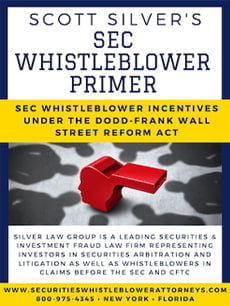The SEC’s Uniform Definition of a Whistleblower
In September of 2020, the Securities and Exchange Commission published a new set of rules for its whistleblower program. Among them was a brand-new definition of “whistleblower,” which applies to all aspects of the SEC whistleblower program. This definition says that a “whistleblower” is someone who has provided information to the SEC, in writing, about possible securities law violations.
The clarification comes after the U.S. Supreme Court decided a case asking whether a whistleblower could ever be someone who experienced retaliation without first reporting wrongdoing to the SEC. The Court decided unanimously that it could not. The SEC responded by codifying that decision in its rules, providing clarity for future whistleblowers.
What Is an SEC Whistleblower?The Supreme Court case focused on the retaliation part of the law that created the SEC whistleblower program. That law says that an employer may not fire, demote or otherwise discriminate against someone who reports wrongdoing. If an employer does those things, the whistleblower would be able to sue in federal Court.
In the Supreme Court case, a man tried to do that—but he never reported the wrongdoing to the SEC. Rather, he reported internally that his employer had eliminated some controls required by securities law, and he said the employer fired him for it. The employer said he couldn’t sue because he hadn’t brought the information to the SEC. The Supreme Court ultimately agreed, because that’s what the text of law says.
The SEC’s new rule says the same thing, which means the definition of a whistleblower is the same across all parts of the SEC whistleblower program. To qualify as a whistleblower, you must bring the SEC original information in writing. If you want to sue your employer for retaliation, you must do that before the retaliation happens. The new rules also say that retaliation is anything “that a reasonable employee would find materially adverse.”
Go to the SEC FirstBy narrowing the definition of “whistleblower” to include only those who report their information to the SEC, the new rule creates a powerful incentive for whistleblowers to go to the SEC first or at the same time as they report to their employers. Another incentive is that the SEC whistleblower program, unlike most employers, offers a financial award if the information leads to a penalty of more than $1 million. But there are rules that you must carefully follow to collect that award, so it’s important to ensure that you understand them.
An experienced SEC whistleblower attorney, like the ones at Silver Law and the Law Firm of David R. Chase, can help. Both lead attorneys are career-long securities lawyers who offer guidance to SEC whistleblowers, maximizing their chances of a large award. Scott Silver is the author of a well-regarded outline of the SEC whistleblower program, which he offers free of charge. David Chase is a former SEC enforcement attorney, so he has an insider’s perspective on enforcement of financial laws. To set up a meeting with the firm, call today at 800.975.4345 or send a message online.

 Silver Law Group Home
Silver Law Group Home
